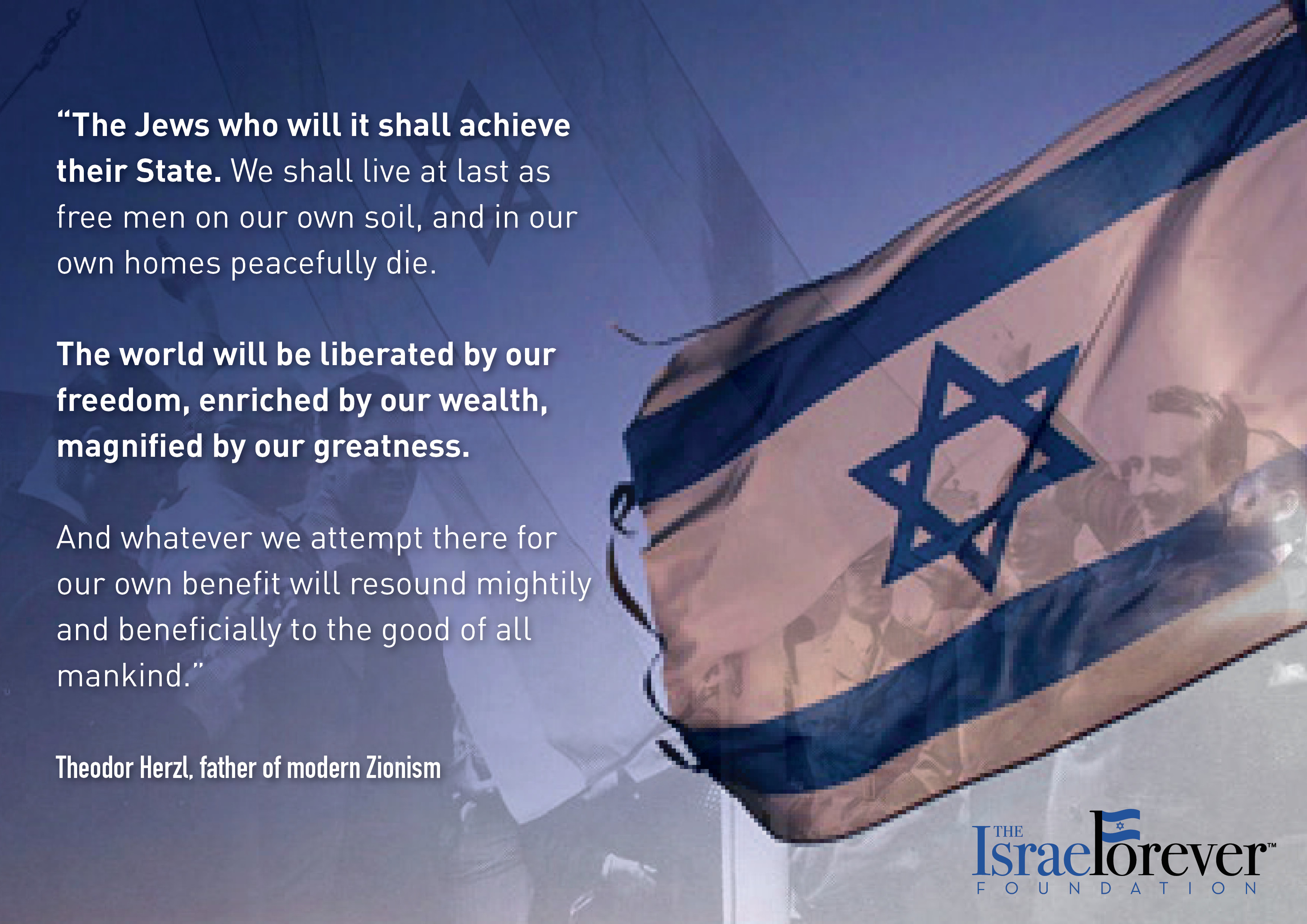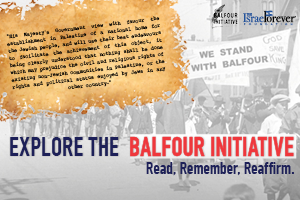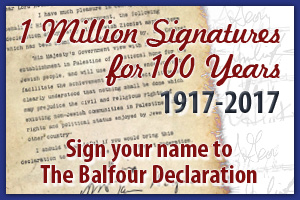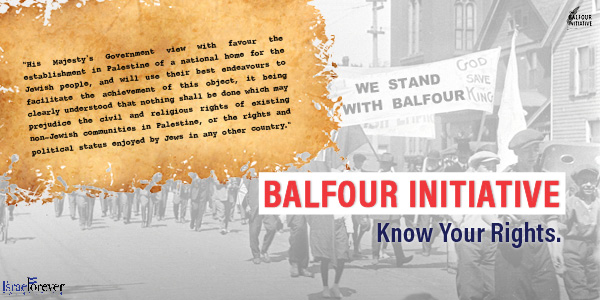Arab-Israeli Rights: A Balfour Declaration Dilemma

Israeli tanks advancing on the Golan Heights during the Six Day War
At the conclusion of the Six Day War, Levi Eshkol wrote about the complexities of the Arab-Jewish relations at the 50th anniversary of the Balfour Declaration. Does his affirmation hold true today or have implications even for the current situation in which Israel and the Jewish People find itself.
With a strong command of the facts surrounding the historical development of the Israeli-Arab conflict, it becomes easier to know and understand the influences that created the current dynamic, which are crucial to any analysis or shaping of opinion on Israel’s ongoing predicament with its Arab citizens and neighbors.
In short: it is much more complicated than it may appear. When approaching the conflict, the Balfour Declaration is an important document to understand. Whereas the focus of the document rightly recognizes that the land belongs to the Jewish people as their homeland, the emphasis on the rights of its non-Jewish inhabitants are prominently featured in the final, official letter.

If we look back to Herzl’s writings, he, too, emphasized the rights of those in the land. Although Herzl believed in having a Jewish state, to him, such a land implied it would be built on peace and freedom for all citizens living within. Following the premise of the Jewish teaching that we should be a “light unto nations,” it was not enough for the future Jewish state to just belong to the Jewish people, but rather that it would be an exemplary society that could inspire and benefit all residents who would see the value of Jewish ideals, tradition, and the impact on their own lives.
As Herzl said, “The Jews who will it shall achieve their State. We shall live at last as free men on our own soil, and in our own homes peacefully die. The world will be liberated by our freedom, enriched by our wealth, magnified by our greatness. And whatever we attempt there for our own benefit will redound mightily and beneficially to the good of all mankind.”
The Balfour Declaration outlined one aspect of how the land conflict could be successfully managed: a sovereign Jewish State and its Arab citizens being treated with dignity and respect. As Herzl explains in the quote above, the Jewish people are obliged to be use our ethics and morals to create a society that welcomes all. However, within the structure of a Jewish democratic state with residents of many faiths, ethnicities and cultural identities, it is a bigger challenge today than even Herzl could have imagined.
Facts show that the Jewish population in the early years of Jewish settlement in the Land of Israel, as well as the government of the State of Israel since her establishment, have time and again made efforts to abide by this goal, creating laws and social standards that enable coexistence between Jews, Arabs, Muslims, Christians and others living in the land.
Unfortunately, in addition to the terror we see some Israeli Arabs, who are legal citizens of the State and thus possess a Teudah Zehut/identity card, receive equal rights and benefits, vote in elections, etc., taking part in or supporting acts of terrorism against the citizens of Israel. Too often, we see how they seek to inflict harm, they honor and celebrate their martyrs, and their education system continues to debase and demonize the Jews in every way. Moreover, their leadership takes little responsibility in the continued incitement to harm and murder. Inevitably, it causes speculation as to the legitimacy of the rights offered them in light of the lack of reciprocal respect towards their fellow citizens of Israel.
Thus we must ask ourselves, and of Levi Eshkol’s theory: what is the relevance to the disregard for the rights of Jewish citizens of the land, in accordance with the same premise set forth by the Balfour Declaration? Do the Arab citizens share responsibility of valuing and respecting the Jews, albeit even if they disagree with the premise of the state or certain actions of the government?
Moreover, how are the Jews supposed to be able to trust the Arabs as well as value and respect them when the we often need to fear them for our own lives? While the Arabs, perhaps, feel unrespected due to certain boundaries or limitations (such as the checkpoints or different levels of citizenship), to what extent do they bear responsibility for the “status quo” as they continue to foster and support terrorism? Does their emphasis on fostering Jewish fear, anxiety, paranoia, and resentment somehow negate the respect that the Jewish state should provide? These questions, unfortunately, were left out of Eshkol’s analysis and are deserving of consideration.
We know that the leadership of Israel has tried time and again to come up with solutions, but the lack of respect and recognition of the Jewish historical connection to the land are one of several issues hindering the true social equality that Eshkol laid forth in his statement 50 years after the Balfour Declaration.
Whereas it is certainly the responsibility for historians and advocates of Israel to learn and engage with the concrete facts of conquest, settlements and governance in accordance with international law, the topic of the Arab-Israeli conflict and these social realities are important for all Jews so that they can feel ready to defend Israel with facts in any situation that comes their way and, more importantly, to feel pride in Israel’s continued efforts to live up to this important aspect of the Balfour Declaration.
Until there is cooperation from both sides toward historical honor and justice, the Balfour Declaration’s intention can be hard if not impossible to follow through. It may be 100 years later but there is still a lot that must be accomplished before the message of the Balfour Declaration can be successfully and meaningfully fulfilled. With knowledge, understanding, and commitment of each Jew toward the collective responsibility we share, transmitting to our own youth as well as to the rest of the world, we can get one step closer to that goal.
DISCUSSION QUESTIONS
- Do you believe that it is the responsibility of every Jew to delve deeply into the Arab-Israeli conflict or do you think that the conflict should be left up to politicians?
- What is one way that Jews today can truly study and understand the importance of the conflict?
- How have you personally learned about the conflict and in what ways has that helped you connect to Israel and stand up for what you believe in?
- Do you think that there will ever be cooperation between the Arabs and the Israelis and what would need to happen to make this possible?
Recommended for you:
Jewish rights to our ancestral homeland are unassailable. Learn about the Balfour Declaration as a symbol of Jewish legal rights and an important milestone to sovereignty in the Jewish homeland.
About the Author









